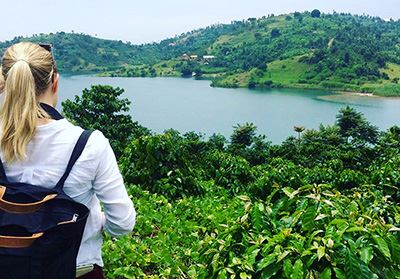Happy beans are the recipe for the world’s best coffee
Paulig tells consumers about the journey of coffee beans from plant to cup and invests in the coffee’s sustainable value chain. As sustainability and a profound knowledge of the origin of coffee are prerequisites for the future of coffee, Paulig also visits the countries of origin regularly.

Paulig Coffee’s Sourcing Manager Anna Vänskä has just spent a year touring coffee-producing countries in South and Central America and Africa. On site, she could see in practice what the everyday life of coffee farmers is like and which factors have an impact on the bright future of coffee and could discuss these topics with the farmer communities. For Paulig, the focus is on profitable coffee farming to ensure that there is delicious, high-quality coffee available to future generations, too.
“Knowing the coffee’s origin and background makes a coffee break even more pleasant. A profound knowledge of the origin of coffee is a cornerstone of our sustainability work and I think it is important that we also tell consumers about the different coffee production phases from plant to cup. Our goal is to make the world’s best coffee, which is born only from beans that have gone through a sustainable value chain,” comments Vänskä. She goes on to say:
“The bright future of coffee is threatened by many different factors, such as climate change and the unprofitability of coffee farming. We are constantly working for the bright future of coffee and our premise is that each party involved in the coffee chain earns a sufficient livelihood and that coffee is grown respecting biodiversity. Indeed, we are committed to ensuring that all of our coffees are verified sustainable, that is: sourced through our partnership programmes or have UTZ, Rainforest Alliance or Fair Trade and Luomu (Organic) certification,” Vänskä summarises.
Win a trip to see happy beans
This autumn, Paulig offers you an opportunity to see how sustainable coffee is grown. Early this autumn, Paula of Paulig, together with the YouTuber Roni Back, will arrange a raffle on YouTube. The winner will travel with them to Colombia to see happy beans in November 2018. The campaign will start on 24 August on Paulig’s YouTube channel. In November, you can follow the trip on Paulig’s and Roni Back’s channels.

Learn more about Paulig’s sustainability work: www.paulig.com/en/sustainability
Further information and photos:
Pirjo Hästbacka, Communications Manager, Paulig,
tel. +358 50 356 8359, media@paulig.com,
https://news.cision.com/fi/paulig-group
About Paulig:
Paulig is a family-owned, international group in the food industry that is noted for its high-quality brands and services. The company’s key areas are Paulig Coffee, Paulig Foods and Paulig Snacks. Our brands are Paulig, Santa Maria, Risenta, Gold&Green and Poco Loco. Paulig has 2.000 employees in 13 countries and its net sales in 2017 were EUR 929 million.
www.pauliggroup.com
Paulig Coffee is the market leader in Finland and the Baltic countries and in Russia it is the second-biggest supplier of roasted coffee. Paulig supplies its products and services to the retail trade, the HoReCa sector and workplaces through the Paulig Professional business unit. In Finland, Paulig's best-known brand products include Juhla Mokka, Presidentti, Paulig Brazil and Paulig Mundo as well as the coffee beverage Paulig Frezza and the drinking chocolate beverage Paulig Tazza. The most popular products on the Russian and Baltic markets are the Presidentti and Paulig Classic coffees and Paulig espresso products. The most recent addition to the coffee product family is Mode Cold Brew coffee that is sold in the Finnish, Swedish and Baltic markets. The company's coffee roasteries are located in Vuosaari in Helsinki, in Porvoo in Finland and in Tver in Russia. The Vuosaari roastery produces some 100 million packages of coffee or roughly 45 million kilos of coffee per year.
www.paulig.com/en





